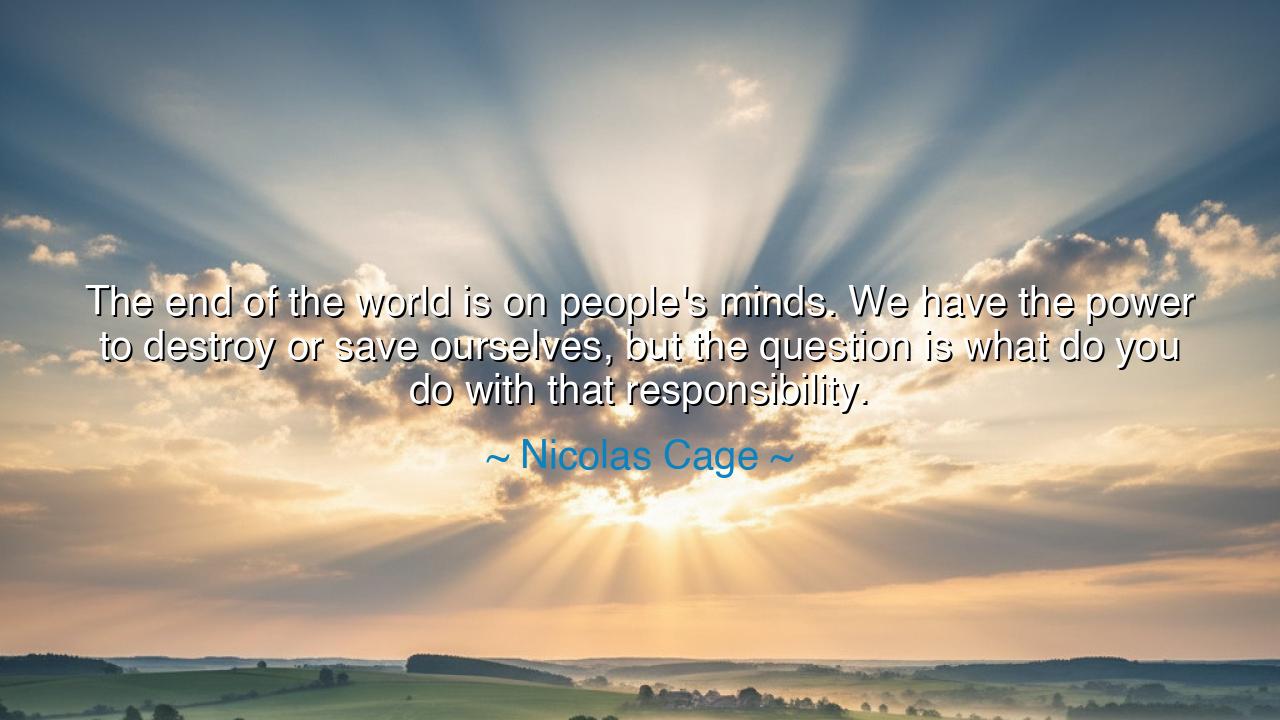
The end of the world is on people's minds. We have the power to
The end of the world is on people's minds. We have the power to destroy or save ourselves, but the question is what do you do with that responsibility.






Hearken, children of the ages, to the stirring words of Nicolas Cage, who proclaimed: “The end of the world is on people's minds. We have the power to destroy or save ourselves, but the question is what do you do with that responsibility.” In these words lies the eternal truth of human agency, responsibility, and the weight of choice. The fate of life and civilization rests not in the stars alone, but in the hands of mortals, whose deeds may either preserve the world or hasten its ruin.
Cage speaks to the moral gravity of power. The capacity to harm or heal, to destroy or protect, is a burden and a gift, demanding wisdom, courage, and foresight. Every action, every decision ripples outward, shaping destinies far beyond the self. The question is not simply the possession of power, but the stewardship of it: how shall one wield it in the service of life, justice, and the future?
Consider the tale of Julius Caesar, who held the fate of the Roman Republic in his hands. With unmatched power, he could have acted in narrow self-interest, yet even in his ambition, the consequences of his choices echoed through generations. His life exemplifies the peril Cage warns of: when humans wield great power without temperance, the world trembles at their decisions. Conversely, those who act with prudence and justice may safeguard the well-being of countless generations.
The ancients, too, reflected upon this eternal dilemma. The philosophers of Greece, the prophets of Israel, and the sages of the East all warned that responsibility is inseparable from power. To possess the capacity to influence the fate of men and the world is both honor and burden; the moral soul is tested in how it exercises authority, foresight, and restraint. Cage’s reflection echoes this timeless teaching: the destiny of life depends on human choice.
Thus, his counsel is both exhortation and reflection: recognize the weight of your power, understand the stakes of your actions, and act with courage and conscience. The end of the world may loom in the minds of men, but hope resides in the careful, deliberate, and righteous use of the power granted to us. Wisdom and virtue are the shields that preserve life from destruction.
Carry this teaching, children of generations yet unborn: in every deed, in every decision, weigh the consequences upon the world. Responsibility is the crucible of humanity, and through mindful, just, and courageous action, mortals may choose not the path of ruin, but that of salvation, ensuring the continuance of life and the flourishing of generations yet to rise.






MDNhat Minh Dinh
This quote leaves me unsettled, but in a good way. It forces reflection on what responsibility means in an age of existential risk. Humanity’s capacity to create and destroy has never been so tangible, yet moral clarity feels more elusive than ever. I can’t help but wonder—does awareness of danger actually motivate change, or just deepen cynicism? Perhaps the real challenge isn’t saving the world, but learning to deserve saving it.
AHAhha Hak
What I like about this quote is how it humanizes an overwhelming topic. Instead of cosmic fatalism, it focuses on personal and collective choice. I think Cage is pointing to the moral weight of modern power—technological, political, and ecological. We can’t claim ignorance anymore. Still, I wonder whether people feel too powerless to act. How do we inspire accountability when the problems are global and the solutions require cooperation few seem willing to give?
HVTran Ha Vy
This reflection resonates with the anxiety of modern life. Between environmental collapse, nuclear tension, and AI ethics, it often feels like we’re living on the edge of something irreversible. But I appreciate Cage’s framing—it’s not about doom, but responsibility. It makes me wonder if awareness alone is enough. How do we turn that awareness into collective action rather than paralysis? Maybe the end of the world isn’t inevitable, just optional.
H77 Phuc Hau 7A
I find this statement both sobering and motivating. It reminds me that apocalyptic fear isn’t just about external threats—it’s about human agency. We hold the tools for both progress and annihilation. But Cage’s emphasis on responsibility hits hardest: what do we *do* with that power? It feels like a moral test of our age. Can individuals make meaningful choices when global systems seem so vast and indifferent to change?
DTdo tinhh
This quote feels hauntingly relevant. It captures the paradox of our time—humanity has advanced so far that our own power now threatens our survival. Cage’s words make me think about collective responsibility. Do we truly grasp the weight of our choices when it comes to technology, climate, and war? Maybe the real question isn’t whether we *can* save ourselves, but whether we’re mature enough as a species to choose restraint over destruction.